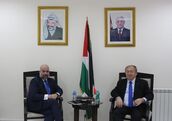12 feb 2020

Prime Minister Muhammad Shtayyeh today welcomed the release by the High Commissioner for Human Rights of the database of companies involved in the illegal Israeli settlements in occupied Palestine and called on these companies to close their branches in the settlements, threatening to pursue them legally.
"Publishing the database of investors in the settlements is a step towards exposing settlements and attempts to legalize them, as well as implementing international resolutions rejecting them, especially the decision of the International Court of Justice ruling on the illegality of settlements built in the West Bank, Jerusalem and the Golan Heights, and the need to take a clear position regarding them," he said in a statement issued by his office.
Shtayyeh called on companies to immediately close their offices and branches in the illegal Israeli settlements, whose existence violates international laws and UN resolutions.
"We will pursue the companies listed in the report legally through international legal institutions and through the courts in their countries for their role in violating human rights, and we will demand compensation for illegally using our occupied lands and for engaging in economic activity in our lands without submitting to Palestinian laws and paying taxes," he said.
Shtayyeh proposed to consider the possibility of moving the factories and branches of these companies to Palestinian cities and villages if they want to rectify their situation.
"Publishing the database of investors in the settlements is a step towards exposing settlements and attempts to legalize them, as well as implementing international resolutions rejecting them, especially the decision of the International Court of Justice ruling on the illegality of settlements built in the West Bank, Jerusalem and the Golan Heights, and the need to take a clear position regarding them," he said in a statement issued by his office.
Shtayyeh called on companies to immediately close their offices and branches in the illegal Israeli settlements, whose existence violates international laws and UN resolutions.
"We will pursue the companies listed in the report legally through international legal institutions and through the courts in their countries for their role in violating human rights, and we will demand compensation for illegally using our occupied lands and for engaging in economic activity in our lands without submitting to Palestinian laws and paying taxes," he said.
Shtayyeh proposed to consider the possibility of moving the factories and branches of these companies to Palestinian cities and villages if they want to rectify their situation.

The head of the International Quartet in Palestine, John Clark, affirmed today that his office is going to intervene regarding the Israeli decision to ban Palestinian exports of agricultural products and to take the necessary steps in cooperation with international partners in relation to the Israeli decision.
This came during his meeting with Minister of Economy Khaled Osaili at the ministry’s headquarters in Ramallah to discuss the implications of the Israeli decision and its turning back truckloads of agricultural products consisting of olive oil, dates and medicinal herbs intended for export to the United States, Sweden, Turkey and others countries.
Osaili briefed Clark on the ramifications of the Israeli decision and the Palestinian government's response to it by stopping the import of Israeli vegetables, fruits, juices, mineral water and carbonated drinks into the Palestinian markets.
The two sides also discussed the current economic situation in Palestine and the Israeli policies and measures related to import and export, pointing to the importance of international assistance for improving the Palestinian economy.
This came during his meeting with Minister of Economy Khaled Osaili at the ministry’s headquarters in Ramallah to discuss the implications of the Israeli decision and its turning back truckloads of agricultural products consisting of olive oil, dates and medicinal herbs intended for export to the United States, Sweden, Turkey and others countries.
Osaili briefed Clark on the ramifications of the Israeli decision and the Palestinian government's response to it by stopping the import of Israeli vegetables, fruits, juices, mineral water and carbonated drinks into the Palestinian markets.
The two sides also discussed the current economic situation in Palestine and the Israeli policies and measures related to import and export, pointing to the importance of international assistance for improving the Palestinian economy.

Israeli settlement Kokhav Ya'akov in the West Bank, February 2020
The UN Human Rights Office issued today its long-awaited report on business enterprises involved in certain activities relating to settlements in the Occupied Palestinian Territory, according to a press release.
The report came in response to a specific request by the UN Human Rights Council, contained in a March 2016 resolution, that mandated the Office to produce a database of business enterprises involved in such activities.
In an interim report presented to the Human Rights Council in March 2018 by the then High Commissioner, Zeid Ra’ad Al Hussein, the UN Human Rights Office noted it had reviewed information that was publicly available, or had been received from a variety of sources, about an initial 307 companies.
After further research, the total number reviewed increased to 321. Of these, a total of 206 companies were considered for further assessment, said the press release.
The report released today sets out conclusions following further communications with business entities, as well as a thorough review and assessment of all information available. It identifies 112 business entities which the UN Human Rights Office, on the basis of the information it has gathered, has reasonable grounds to conclude have been involved in one or more of the specific activities referenced in Human Rights Council resolution 31/36.
Of the 112 business entities identified in the report, 94 are domiciled in Israel and 18 in six other States. During the complex process of drawing up the database, the Office consulted the UN Working Group on Business and Human Rights, and held widespread discussions with numerous States, civil society organizations, think tanks, academics and others, as well as having extensive interactions with the companies themselves, according to the press release.
The report makes clear that the reference to these business entities is not, and does not purport to be, a judicial or quasi-judicial process. While the settlements as such are regarded as illegal under international law, this report does not provide a legal characterization of the activities in question, or of business enterprises’ involvement in them.
Any further steps with respect to the continuation of this mandate will be a matter for the Member States of the Human Rights Council, which will consider the report during the Council’s next session, beginning on 24 February.
“I am conscious this issue has been, and will continue to be, highly contentious,” said Michelle Bachelet, the current High Commissioner for Human Rights. “However, after an extensive and meticulous review process, we are satisfied this fact-based report reflects the serious consideration that has been given to this unprecedented and highly complex mandate, and that it responds appropriately to the Human Rights Council’s request contained in resolution 31/36,” Bachelet said.
Human Rights Council resolution 31/36, adopted on 24 March 2016, requested the Office of the UN High Commissioner for Human Rights to produce a report to follow up on the 2013 report of the Independent International Fact-Finding Mission to investigate the implications of the Israeli settlements on the civil, political, economic, social and cultural rights of the Palestinian people throughout the Occupied Palestinian Territory, including East Jerusalem (A/HRC/22/63).
The resolution defined the parameters of the current report by reference to ten specific activities listed in Paragraph 96 of the Fact-Finding Mission’s report. Human Rights Council resolution 31/36 was adopted with 32 States in favor, none against and 15 abstentions.
It recalls reports of the UN Secretary-General, resolutions of the UN General Assembly and Security Council, an advisory opinion of the International Court of Justice and the opinions of several human rights bodies reaffirming the illegality of the Israeli settlements in the Occupied Palestinian Territory, including in East Jerusalem.
Listed companies with business ties to West Bank settlements
The UN Human Rights Office issued today its long-awaited report on business enterprises involved in certain activities relating to settlements in the Occupied Palestinian Territory, according to a press release.
The report came in response to a specific request by the UN Human Rights Council, contained in a March 2016 resolution, that mandated the Office to produce a database of business enterprises involved in such activities.
In an interim report presented to the Human Rights Council in March 2018 by the then High Commissioner, Zeid Ra’ad Al Hussein, the UN Human Rights Office noted it had reviewed information that was publicly available, or had been received from a variety of sources, about an initial 307 companies.
After further research, the total number reviewed increased to 321. Of these, a total of 206 companies were considered for further assessment, said the press release.
The report released today sets out conclusions following further communications with business entities, as well as a thorough review and assessment of all information available. It identifies 112 business entities which the UN Human Rights Office, on the basis of the information it has gathered, has reasonable grounds to conclude have been involved in one or more of the specific activities referenced in Human Rights Council resolution 31/36.
Of the 112 business entities identified in the report, 94 are domiciled in Israel and 18 in six other States. During the complex process of drawing up the database, the Office consulted the UN Working Group on Business and Human Rights, and held widespread discussions with numerous States, civil society organizations, think tanks, academics and others, as well as having extensive interactions with the companies themselves, according to the press release.
The report makes clear that the reference to these business entities is not, and does not purport to be, a judicial or quasi-judicial process. While the settlements as such are regarded as illegal under international law, this report does not provide a legal characterization of the activities in question, or of business enterprises’ involvement in them.
Any further steps with respect to the continuation of this mandate will be a matter for the Member States of the Human Rights Council, which will consider the report during the Council’s next session, beginning on 24 February.
“I am conscious this issue has been, and will continue to be, highly contentious,” said Michelle Bachelet, the current High Commissioner for Human Rights. “However, after an extensive and meticulous review process, we are satisfied this fact-based report reflects the serious consideration that has been given to this unprecedented and highly complex mandate, and that it responds appropriately to the Human Rights Council’s request contained in resolution 31/36,” Bachelet said.
Human Rights Council resolution 31/36, adopted on 24 March 2016, requested the Office of the UN High Commissioner for Human Rights to produce a report to follow up on the 2013 report of the Independent International Fact-Finding Mission to investigate the implications of the Israeli settlements on the civil, political, economic, social and cultural rights of the Palestinian people throughout the Occupied Palestinian Territory, including East Jerusalem (A/HRC/22/63).
The resolution defined the parameters of the current report by reference to ten specific activities listed in Paragraph 96 of the Fact-Finding Mission’s report. Human Rights Council resolution 31/36 was adopted with 32 States in favor, none against and 15 abstentions.
It recalls reports of the UN Secretary-General, resolutions of the UN General Assembly and Security Council, an advisory opinion of the International Court of Justice and the opinions of several human rights bodies reaffirming the illegality of the Israeli settlements in the Occupied Palestinian Territory, including in East Jerusalem.
Listed companies with business ties to West Bank settlements
|
Afikim Public Transportation Ltd.
Airbnb Inc. American Israeli Gas Corporation Ltd. Amir Marketing and Investments in Agriculture Ltd. Amos Hadar Properties and Investments Ltd. Angel Bakeries Archivists Ltd. Ariel Properties Group Ashtrom Industries Ltd. Ashtrom Properties Ltd. Avgol Industries 1953 Ltd. Bank Hapoalim B.M. Bank Leumi Le-Israel B.M. Bank of Jerusalem Ltd. Beit Haarchiv Ltd. Bezeq, the Israel Telecommunication Corp Ltd. Booking.com B.V. C Mer Industries Ltd. Café Café Israel Ltd. Caliber 3 Cellcom Israel Ltd. Cherriessa Ltd. Chish Nofei Israel Ltd. Citadis Israel Ltd. Comasco Ltd. Darban Investments Ltd. Delek Group Ltd. Delta Israel Dor Alon Energy in Israel 1988 Ltd. Egis Rail Egged, Israel Transportation Cooperative Society Ltd. Energix Renewable Energies Ltd. EPR Systems Ltd. Extal Ltd. Expedia Group Inc. Field Produce Ltd. Field Produce Marketing Ltd. First International Bank of Israel Ltd. Galshan Shvakim Ltd. General Mills Israel Ltd. Hadiklaim Israel Date Growers Cooperative Ltd. Hot Mobile Ltd. Hot Telecommunications Systems Ltd. Industrial Buildings Corporation Ltd. Israel Discount Bank Ltd. Israel Railways Corporation Ltd. Italek Ltd. JC Bamford Excavators Ltd. Jerusalem Economy Ltd. Kavim Public Transportation Ltd. Lipski Installation and Sanitation Ltd. Matrix IT Ltd. Mayer Davidov Garages Ltd. Mekorot Water Company Ltd. Mercantile Discount Bank Ltd. |
Merkavim Transportation Technologies Ltd.
Mizrahi Tefahot Bank Ltd. Modi'in Ezrachi Group Ltd. Mordechai Aviv Taasiot Beniyah 1973 Ltd. Motorola Solutions Israel Ltd. Municipal Bank Ltd. Naaman Group Ltd. Nof Yam Security Ltd. Ofertex Industries 1997 Ltd. Opodo Ltd. Bank Otsar Ha-Hayal Ltd. Partner Communications Company Ltd. Paz Oil Company Ltd. Pelegas Ltd. Pelephone Communications Ltd. Proffimat S.R. Ltd. Rami Levy Chain Stores Hashikma Marketing 2006 Ltd. Rami Levy Hashikma Marketing Communication Ltd. Re/Max Israel Shalgal Food Ltd. Shapir Engineering and Industry Ltd. Shufersal Ltd. Sonol Israel Ltd. Superbus Ltd. Tahal Group International B.V. TripAdvisor Inc. Twitoplast Ltd. Unikowsky Maoz Ltd. YES Zakai Agricultural Know-how and inputs Ltd. ZF Development and Construction ZMH Hammermand Ltd. Zorganika Ltd. Zriha Hlavin Industries Ltd. Alon Blue Square Israel Ltd. Alstom S.A. Altice Europe N.V. Amnon Mesilot Ltd. Ashtrom Group Ltd. Booking Holdings Inc. Brand Industries Ltd. Delta Galil Industries Ltd. eDreams ODIGEO S.A. Egis S.A. Electra Ltd. Export Investment Company Ltd. General Mills Inc. Hadar Group Hamat Group Ltd. Indorama Ventures P.C.L. Kardan N.V. Mayer's Cars and Trucks Co. Ltd. Motorola Solutions Inc. Natoon Group Villar International Ltd. Greenkote P.L.C. |
Foreign Minister welcomes issuance of database of companies involved in Israeli settlements
PLO welcomes release of UN database of companies involved in Israeli settlements
PLO welcomes release of UN database of companies involved in Israeli settlements
9 feb 2020

Minister of National Economy, Khaled Osseili, said on Sunday, that the Palestinian government was pursuing political, diplomatic and legal action to reverse Israel’s recent ban on the export of Palestinian agricultural abroad, which is aimed at stifling the Palestinian economy, WAFA reported.
At an emergency meeting of the Palestinian Exports Council in Ramallah, Osseili described the Israeli ban as a flagrant violation of the rules of the World Trade Organization, to which Israel is a member.
He affirmed the Palestinian government’s support for local farmers and exporters, and stressed the importance of joining forces by all parties.
Tareq Abu Laban, assistant undersecretary for the economic sector in the Ministry of Agriculture, stated on Sunday, that the decision to ban all Palestinian agricultural exports to the world markets via Jordan came into effect today.
In a phone interview with WAFA, Abu Laban said that the Israeli government’s decision to ban the export of Palestinian vegetables, fruits, olive oil and dates was in response to the Palestinian government’s October 2019 decision to ban the import of Israeli calves into the Palestinian market.
The value of these exports amounts to $100 million annually, and the majority of them are cultivated in the Jordan Valley region, which Israel has threatened to annex under the so called “deal of the century” proposal.
Last week, the Palestinian government, declared a ban on Israeli products coming into the Palestinian market, including vegetables, fruits, juices, mineral water and carbonated drinks, in response to Bennet’s decision to ban Palestinian agricultural products into Israel.
At an emergency meeting of the Palestinian Exports Council in Ramallah, Osseili described the Israeli ban as a flagrant violation of the rules of the World Trade Organization, to which Israel is a member.
He affirmed the Palestinian government’s support for local farmers and exporters, and stressed the importance of joining forces by all parties.
Tareq Abu Laban, assistant undersecretary for the economic sector in the Ministry of Agriculture, stated on Sunday, that the decision to ban all Palestinian agricultural exports to the world markets via Jordan came into effect today.
In a phone interview with WAFA, Abu Laban said that the Israeli government’s decision to ban the export of Palestinian vegetables, fruits, olive oil and dates was in response to the Palestinian government’s October 2019 decision to ban the import of Israeli calves into the Palestinian market.
The value of these exports amounts to $100 million annually, and the majority of them are cultivated in the Jordan Valley region, which Israel has threatened to annex under the so called “deal of the century” proposal.
Last week, the Palestinian government, declared a ban on Israeli products coming into the Palestinian market, including vegetables, fruits, juices, mineral water and carbonated drinks, in response to Bennet’s decision to ban Palestinian agricultural products into Israel.
7 feb 2020

The Ministry of National Economy said in a statement today that Israeli occupation authorities have recently returned back several Palestinian-produced truckloads of agricultural products that were destined for export abroad.
It said that during the past two days, Israeli occupation authorities banned the exit of all Palestinian agricultural items to the outside world, and informed their exporters that the ban would remain in effect until further notice.
"The decision of the Israeli "Defense" Minister Naftali Bennet was apparently not restricted to preventing the entry of Palestinian agricultural products to the Israeli market, but also included a ban on such exports to the countries of the world, including dates and olive oil," said the ministry.
Earlier this week, the Palestinian government declared a ban on the entry of Israeli products into the Palestinian market, including vegetables, fruits, juices, mineral water and carbonated drinks.
This was in response to Bennet’s decision banning the entry of Palestinian agricultural products into Israel, in retaliation for the Palestinian government's boycott of Israeli-produced cattle for almost four months.
Exports of Palestinian agricultural products to Israel amounted to 88 million dollars during 2018, which represents 68% of the total Palestinian agricultural exports to the world, estimated at 130 million dollars in 2018.
It said that during the past two days, Israeli occupation authorities banned the exit of all Palestinian agricultural items to the outside world, and informed their exporters that the ban would remain in effect until further notice.
"The decision of the Israeli "Defense" Minister Naftali Bennet was apparently not restricted to preventing the entry of Palestinian agricultural products to the Israeli market, but also included a ban on such exports to the countries of the world, including dates and olive oil," said the ministry.
Earlier this week, the Palestinian government declared a ban on the entry of Israeli products into the Palestinian market, including vegetables, fruits, juices, mineral water and carbonated drinks.
This was in response to Bennet’s decision banning the entry of Palestinian agricultural products into Israel, in retaliation for the Palestinian government's boycott of Israeli-produced cattle for almost four months.
Exports of Palestinian agricultural products to Israel amounted to 88 million dollars during 2018, which represents 68% of the total Palestinian agricultural exports to the world, estimated at 130 million dollars in 2018.
